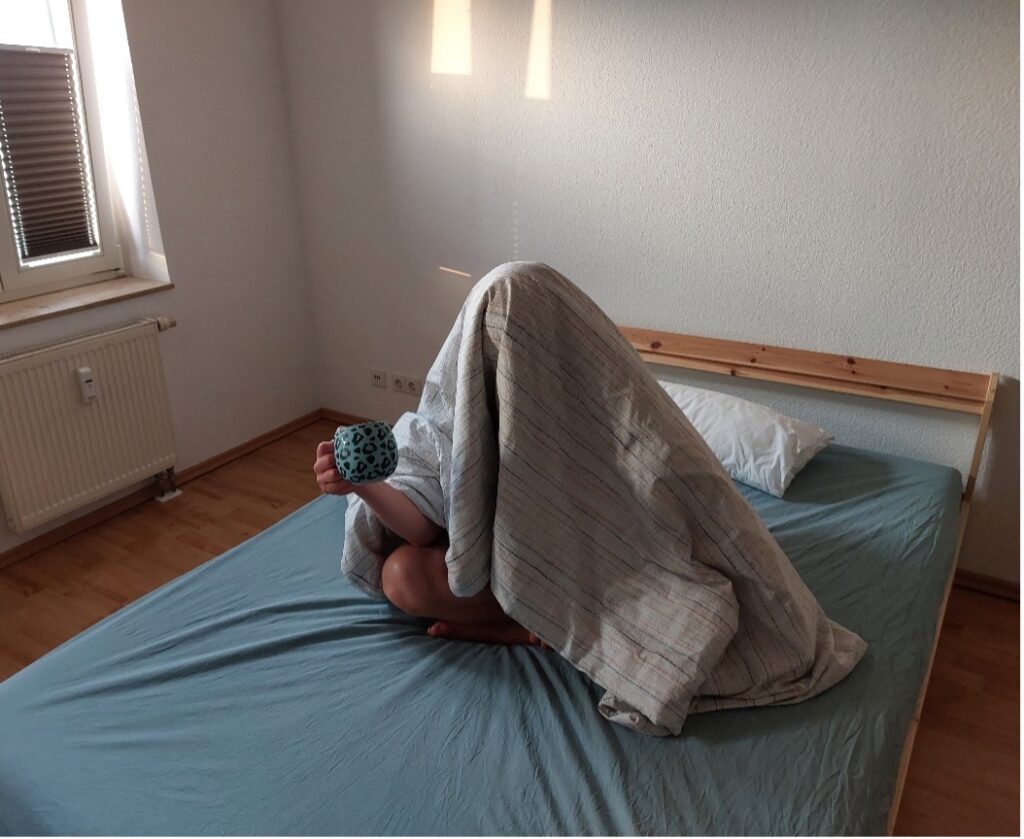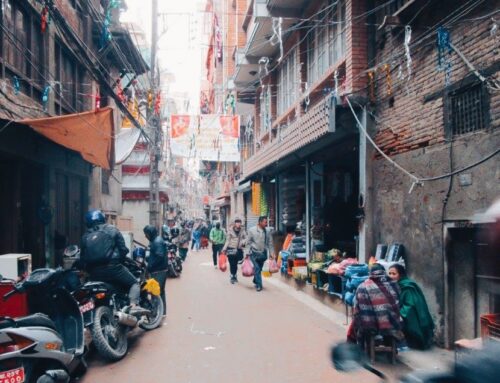“Hope springs eternal,” 60-year-old Mr. Peters told me when I asked him how he felt when he went to bed in the evenings. “I live in hope,” he added with a smile, “every evening I think: this night is going to be my night!” Mr. Peters had been suffering from insomnia for several years. He had massive troubles falling, and staying, asleep. Thus, his nightly sleep was highly fragmented, leading him to feel tired, fatigued, and sleepy during the day, on most days. Mr. Peters seemed like an accepting man. Despite his suffering, he talked about his problems in a calm and humorous way. “So what do you do when you can’t sleep at night?” I wanted to know. “Nothing,” he laughed, “I suffer and hope.”
I met Mr. Peters during my fieldwork with sleep-disturbed patients at a German sleep laboratory. Whereas many other insomnia patients came across as agitated, desperate, and hopeless (often because they had been struggling, unsuccessfully, for many years to find a cure for their sleeplessness—see Vorhölter 2024), Mr. Peters struck me as calm and curiously optimistic. His attitude reminded me of something that people in Uganda, where I had lived and conducted fieldwork for two previous research projects (Vorhölter 2014, 2019), might have referred to as “stubbornness,” or, perhaps, as “stubborn hope.” In this essay, I take Mr. Peters’ “stubborn hope” as a starting point for conceptual reflection. Drawing on insights from two very different field sites, I ask what insomnia and the Ugandan concept of stubbornness can teach us about modes and moods of despite.

Morning coffee in hand, still waiting for sleep… Credit: B. Vorhölter.
(Not) Sleeping in a Mode of Despite
“When I don’t sleep I lie still for several hours with my heart beating, as if evading some beast; when the adrenaline has built in me I break and I get up and hit things, the wall, my head, my head against the wall. I might howl, I might scream. I’ll pace, pace, as if trying to stalk down an old, better self that has outrun me.” (Harvey 2021, 33)
If living in a mode of despite means holding out amidst hardship while longing for improvement, or trying to maintain a sense of agency while faced with unbearable, often inescapable and seemingly unchangeable conditions, then insomnia offers rich material to think through and develop the concept. Insomnia is a curious condition of despite: insomniacs cannot sleep despite being tired and exhausted. Many lie in bed—waiting, hoping, wanting sleep—despite knowing that actively anticipating sleep reduces the chances of ever drifting off.¹ Some, like Mr. Peters, continue to hope despite failing—again and again and again. Many frequently reach the point of violent despair, when after hours of attempted inaction sleep still hasn’t come. A few eventually give up.² For people suffering from insomnia, sleeplessness is often experienced as a situation of existential crisis and powerlessness, of desperately longing for something—sleep—which they cannot make happen, of being faced with the unbearable feeling of being stuck in a body-mind that is beyond their control.
Attaining sleep is a strange mix of acting and non-acting, a form of active surrender—but one that cannot always be willingly achieved. Sleep requires some form of effort and commitment (e.g. lying down), but at the same time is crucially dependent on letting go. Insomnia is generally considered a treatable condition, which means that sufferers do have some agency: For instance, they can decide to rely on help from other actants, like pills, although this often comes with undesired side-effects (like addiction) and, in some ways, entails further relinquishing self-control. They can regain a sense of being in charge—at least over how they spend their waking hours—by leaving their beds and doing something else. Yet it is hard to give up the desire for sleep, and knowing that lying down means sleep could happen, whereas getting up means it will definitely not, is a thought that is often unbearable for the chronically sleep anxious. So many, like Mr. Peters, stay in bed, stubbornly hoping for sleep.
Seeking sleep in a mode of despite means actively deciding to hang on, to keep searching. In this sense, the notion is different to similar concepts like resilience, agency, or resistance that anthropologists have used to analyze the coping strategies people deploy in the face of powerlessness. While resilience suggests a resource or ability someone possesses, a genetic predisposition more than a choice, both agency and resistance bear the risk of perhaps overestimating the choices people (can) make in the face of power. By contrast, living—or (not) sleeping—in the mode of despite implies choice, albeit a very restricted or “bare” one: not expecting change, but not being able, or willing, to give up hope. It is a particular affective orientation to the world which—as noted above—is arguable similar to a Ugandan emic concept that I encountered in daily conversations during my fieldwork: stubbornness.
Stubbornness as an Attitude of Despite
Calling someone “stubborn” is a pervasive expression in Ugandan English which can convey various things and emotions: it can be a playful admiration of something that is generally considered weird—like when I went for my jogs through the Northern Ugandan town of Gulu in the dusty afternoon heat during my fieldwork, at a time when jogging was not yet a common practice. It can be a way of expressing disapproval or moral outrage: “Eehh,” people would say when observing a child misbehaving, “that boy is too stubborn,” thereby also tacitly making a judgment about his parents. Or it can a way of expressing annoyance at things that endure, on their own terms, against all odds—like viruses, feral plants, or the Ugandan President Yoweri Museveni (who people, and the media,³ often colloquially refer to as a “stubborn old man”). The Ugandan meaning of stubborn does not fundamentally differ from the dictionary definition (“unreasonably or perversely unyielding” according to Merriam-Webster⁴), but the term is deployed much more broadly, diversely, and, perhaps, curiously than in “standard English.” I found an article with the headline “Stubborn man kills himself in Kisoro”⁵ about a man who hanged himself “despite attempts by residents and the police to dissuade him from the act.” Other media reports talked about the stubbornness of LGTBI love in Uganda despite persecution,⁶ of Ugandan opposition politicians who tried to win elections despite knowing they would be rigged,⁷ and of stubborn water weeds which threaten biodiversity in Lake Victoria.⁸ Being stubborn, then, is quintessentially a way of acting or doing something despite: despite peoples’ ridicule, or criticism, or puzzlement; despite it being futile, irrational, or harmful. Stubbornness is often, but not always, a conservative orientation to the world, a way of sticking to habits despite, or as Merriam-Webster puts it, “sturdiness in resisting change, which may or may not be admirable.”⁹

Stubborn hope? Advertisement for a “brain & body energizer” in front of Uganda’s main psychiatric hospital. Photo by author.
Persistence, Ignorance, Hope
Living in a mode of despite is not necessarily heroic, good or bad; it does not imply a value judgment. Rather, it is a concept for analyzing how people (or other living beings) exercise control, however minor, in circumstances that are not of their own choosing and which they often can do very little about. A mode of despite is more than accepting and less than resisting, a curious mix of persistence, ignorance, and hope. While we may associate living in a mode of despite with people living at the margins (the poor, the colonized, the weak), my examples show that many of us live and act in a mode of despite at least some of the time. We stubbornly persist in worlds and bodies that we find hard to accept and almost, but not quite, impossible to change. We experience regret for the past and believe that things could be different—but we don’t know how to create better futures. One of my insomniac interlocutors well-captured this sentiment. When I asked him about the first thing that comes to his mind when he thinks of sleep, his response was: “It would have been so nice…”
Notes
[1] In fact, one of the most basic recommendations when dealing with insomnia is to leave the bed after twenty minutes and to not “toss and turn” (see e.g. www.sleepfoundation.org/sleep-hygiene, accessed 02 July 2024).
[2] Studies show a significant correlation between chronic insomnia and suicide (e.g. Simmons et al. 2020).
[3] https://www.nytimes.com/2014/02/25/opinion/ugandas-stubborn-autocrat.html, accessed 24.01.22.
[4] https://www.merriam-webster.com/dictionary/stubborn, accessed 24.01.22.
[5] https://ugandaradionetwork.net/story/kisoro-man-hangs-himself, accessed 24.01.22.
[6] https://chapterfouruganda.org/sites/default/files/downloads/The-Stubbornness-of-Love-PFLAG.pdf, accessed 24.01.22.
[7] https://www.sandiegouniontribune.com/sdut-ambitious-stubborn-uganda-oppsn-leader-arrested-2011apr21-story.html, accessed 24.01.22.
[8] https://allafrica.com/stories/202005040124.html, accessed 24.01.22.
[9] https://www.merriam-webster.com/dictionary/stubborn, accessed 24.01.22.
References
Harvey, Samantha. 2021. The Sleepless Unease: My Year in Search of Sleep. London: Vintage.
Simmons, Zach, Lance D. Erickson, Dawson Hedges, and Daniel B. Kay. 2020. “Insomnia Is Associated with Frequency of Suicidal Ideation Independent of Depression: A Replication and Extension of Findings from the National Health and Nutrition Examination Survey.” Frontiers in Psychiatry 11 (September):561564. https://doi.org/10.3389/fpsyt.2020.561564.
Vorhölter, Julia. 2024. “(Mis)Perceiving Apnea and Insomnia in Germany: A Tale of Two Disorders.” Medical Anthropology 43 (1): 46–60. https://doi.org/10.1080/01459740.2023.2266858.
Vorhölter, Julia. 2019. “Struggling to be a “Happy Self” – Psychotherapy and the Medicalization of Unhappiness in Uganda?” Current Anthropology 60 (2): 194–223. https://doi.org/10.1086/702337.
Vorhölter, Julia. 2014. Youth at the Crossroads—Discourses on Socio-Cultural Change in Post-War Northern Uganda. Göttingen: Göttingen University Press.
Julia Vorhölter is a senior research fellow at the Max Planck Institute for Social Anthropology in Halle (Saale), Germany. She has conducted extensive fieldwork in Uganda on a wide range of topics, including perceptions of socio-cultural change, post-war humanitarian interventions, gender and generational relations, and emerging forms of psychotherapy. Her current research is based in Germany and focuses on experiences, assessments, and treatments of (disordered) sleep.
Cite as: Vorhölter, Julia. 2024. “The Insomniac’s Stubborn Hope”. In “Living in a Mode of Despite”, edited by Rishabh Raghavan, Mascha Schulz, and Julia Vorhölter, American Ethnologist website, 3 October 2024. [https://americanethnologist.org/online-content/collections/living-in-a-mode-of-despite/the-insomniacs-stubborn-hopeby-julia-vorholter/]
This piece was edited by American Ethnological Society Digital Content Editor Katie Kilroy-Marac (katie.kilroy.marac@utoronto.ca).




